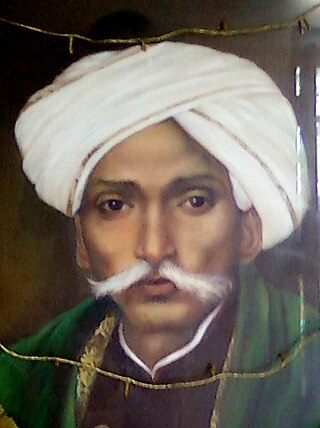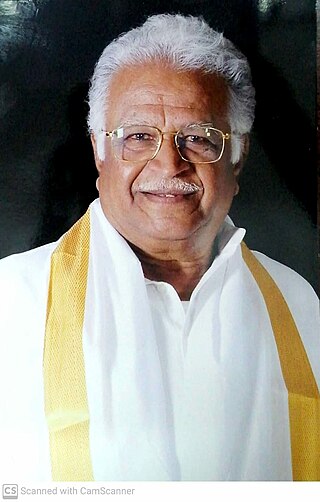Avasarala Ramakrishna Rao | |
|---|---|
| Born | 21 December 1931 |
| Died | 28 October 2011 (aged 79) |
Avasarala Ramakrishna Rao was a Telugu short story writer. His works include Sampengalu-Sannajajulu i.e., Michelia Champaca and Jasmine flowers), [1] Ketu-Dupliketu (i.e., The mischievous and his duplicate), Pekamukkalu (i.e., The playing cards) and Astipanjaram i.e., The skeleton), Rasavadgita, a pun on Bhagavad Gita), Kadilinche katha (i.e., A moving story).
Ramakrishna was born in Tuni in East Godavari district. He worked as a Mathematics and Science teacher there before he did M.A. in English. He had a Ph.D. on George Orwell from Andhra University. [2]
Ramakrishna began his literary career at the age of 17. He authored more than 600 short stories, 15 novels and 4 children's novels. He was known for his wit and humor.
Apart from his short stories, he wrote a number of one-act plays, songs and poems for All India Radio and literary magazines, essays on mathematics and science. Avasarala's feature 'Mathe-me-tricks' (మేథ-में-Tricks i.e., tricks to solve Mathematical problems easily) was carried regularly in the children's magazine, Bala Jyothi (Telugu : బాలజ్యోతి i.e., Light for kids), with a silver jubilee run. This feature posed interesting logical, analytical or mathematical problems every month and the readers would send their answers to win the prize.
At the time of his death, he was writing a column called 'Angrezi-Made-Easy' (i.e., English made easy) for a leading Telugu daily. He contributed regularly to book reviews and a feature called Sebhashitaalu (Telugu : శభాషితాలు, a pun on Subhashitalu) in the Telugu edition of India Today .
According to him, his most satisfying work is Pekamukkalu, a compilation of the short stories published in various magazines over the past 52 years.
He described himself in the following four lines. [3]
In teaching? Non-stop fun!
In writing? Evergreen pun!
Even at seventy-one
I enjoy being two-in-one!
Although he taught English, his writings were in Telugu. His writings reflected his critical views of society and he chose harsh words to describe it according to himself. He was an atheist and wanted people to move from 'foolish faith to pragmatism'. [4] His favorite writers were Ranganayakamma and Volga, both Telugu female writers.
He won the Andhra Pradesh Sahitya Academy award for his anthology of short stories Ardhamunna Kadhalu (Telugu : అర్థమున్న కథలు i.e., Stories with a meaning) in 1969. He was the recipient of "Best Writer in Humour" award of Sri Potti Sriramulutu Telugu University in 1994 and Delhi Telugu Academy's Ugadi Puraskar in 2000. He was felicitated by the Andhra Sanskriti Sangham, Chandigarh in 2000.
He underwent a bypass surgery at NIMS, after which he developed complications leading to death. As he wished, his body was donated to the Osmania Medical College for research. He is survived by wife and son. [2]

Nandamuri Taraka Rama Rao, often referred to by his initials NTR, was an Indian actor, filmmaker and politician who served as Chief Minister of Andhra Pradesh for seven years over three terms. He starred in over 300 films, predominantly in Telugu cinema, and was referred by the media as Viswa Vikhyatha Nata Sarvabhouma. Rao received three National Film Awards for co-producing Thodu Dongalu (1954) and Seetharama Kalyanam (1960) under National Art Theater, Madras, and for directing Varakatnam (1970). Known for his breakthrough performances in Raju Peda (1954) and Lava Kusa (1963), Rao garnered the Nandi Award for Best Actor for Kodalu Diddina Kapuram in 1970, and the Inaugural Filmfare Award for Best Actor – Telugu in 1972 for Badi Panthulu.

Mullapudi Venkata Ramana was an Indian writer known for his work in Telugu language. Noted for his humorous and metaphorical style of writing, Mullapudi received Raghupathi Venkaiah Award from the Government of Andhra Pradesh in 1986 for his contributions to Telugu cinema and he also won six Nandi Awards.

Gurajada Venkata Apparao was an Indian playwright, dramatist, poet, and writer known for his works in Telugu theatre. Rao wrote the play Kanyasulkam in 1892, which is considered as the greatest play in the Telugu language. One of the pioneers of Indian theatre, Rao holds the titles Kavisekhara and Abyudaya Kavitha Pithamahudu. In 1910, Rao scripted the widely known Telugu patriotic song "Desamunu Preminchumanna".

Telugu literature is the body of works written in the Telugu language. It consists of poems, short stories, novels, plays, and song lyrics, among others. There is some indication that Telugu literature dates at least to the middle of the first millennium, the first extant works are from the 11th century when the Mahabharata was first translated to Telugu from Sanskrit by Nannaya. The language has experienced a golden age under the patronage of the Vijayanagara king-poet Krishnadevaraya.

Ashtadiggajas(అష్టదిగ్గజులు) is the collective title given to the eight Telugu scholars and poets in the court of Emperor Krishnadevaraya who ruled the Vijayanagara Empire from 1509 until his death in 1529. During his reign, Telugu literature and culture reached its zenith. In his court, eight poets were regarded as the eight pillars of his literary assembly. The age of Ashtadiggajas is called Prabandha Age. All of the Ashtadiggajas had composed at least one Prabandha Kavyamu and it was Ashtadiggajas who gave Prabandha its present form. Most of the Ashtadiggajas are from southern part of present-day Andhra Pradesh state (Rayalaseema) and Ashtadiggajas, Allasani Peddana, Dhurjati, Nandi Thimmana, Madayyagari Mallana and Ayyalaraju Ramabhadrudu are from the Rayalaseema. Pandit Ramakrishna hailed from the Guntur district of Andhra Pradesh. Ramarajabhushanudu was another Ashtadiggaja.

P. Bhanumathi Ramakrishna was an Indian actress, singer, film producer, director, music composer, and novelist. She is regarded as the first female super star of Telugu cinema. She is also considered the first female director of Telugu cinema with her debut directorial Chandirani (1953). Bhanumathi appeared in over 100 films predominantly in Telugu and Tamil languages. She was awarded the Padma Bhushan in 2001 for her contribution to the Indian cinema. She was honored among "women in cinema" at the 30th International Film Festival of India.

Tuni is a city in Kakinada district of the Indian state of Andhra Pradesh. It is a second biggest city in Kakinada district. And It is the 15th most populated city in the state. Freedom fighter Alluri Sitaramaraju studied here. It is a major commercial marketing center for more than 200+ surrounding villages in the district. Tuni is a border point for the district of Kakinada. It is known for mango production, with nearly 250 varieties being exported from the area. Tuni City is also known as "Mango City". Tuni is also famous for the production of betel leaves and jute bags. A variety of cashew nuts are also produced in Tuni.

Dr. 'Ampasayya' Naveen is a Telugu novelist. He is an Osmania University alumni, and his college life at OU inspired his first novel, Ampasayya. His novel Kala Rekhalu won the Sahitya Academy Award in 2004.

Telugu theatre is Indian theatre in the Telugu language, based in the states of Andhra Pradesh and Telangana. Gurajada Apparao wrote the play, Kanyasulkam in 1892, which is often considered the greatest play in the Telugu language. C. Pullaiah is cited as the father of Telugu theatre movement.
Nayani Krishnakumari was an Indian scholar, poet, researcher, speaker in Telugu and an active participant in literary and cultural organizations. She served several institutions in various capacities. She received several awards such as Swarnakankanam, instituted by Desoddharaka Kasinathuni Nageswara Rao, Best Telugu Writer award from Potti Sreeramulu Telugu University, and Sahitya Akademi among others.

Gollapudi Maruti Rao was an Indian actor, screenwriter, dramatist, playwright, columnist and dialogue writer known for his works in Telugu cinema, Telugu theatre and Telugu Literature. Rao acted in over 250 Telugu films in a variety of roles. His noted literary works and plays, like Rendu Rellu Aaru, Patita, Karuninchani Devatalu, Mahanatudu, Kaalam Venakku Tirigindi, Aasayaalaku Sankellu, won numerous State Awards.
Palanki Venkata Ramachandra Murthi is an author of stories and books in Telugu for children (1909–2005).
Rayasam Venkata Tripurantakeswara Rao popularly known as Tripura is a famous Telugu short story writer of the 1960s and 1970s. He was born on 2 September 1928 in Purushottampur Tehsil of Ganjam District of Orissa state, India. His father was a surgeon and worked in Government Hospital there.

Kalipatnam Ramarao, known as Kara Master, was an Indian poet and writer known for his Telugu short stories. He won Sahitya Akademi Award in Telugu, 1995 for his short stories Yajnam To Tommidi.
Duggirala Gopalakrishnayya, was an Indian freedom fighter and member of the Indian National Congress from the southern Indian state of Andhra Pradesh. Known by his title of Andhra Ratna (Telugu: ఆంధ్ర రత్న, translates to "Jewel of Andhra" or "Gem of Andhra." Sri Duggirala Gopalakrishnayya, Gopalakrishnayya was the first Andhra leader to become secretary of the All India Congress Committee. Sri Duggirala Gopalakrishnayya, was a very captivating poet, speaker, songwriter, philosopher, singer and an extraordinary revolutionary with a philosophy of non-violence. Sri Nadimpalli Venkata Lakshmi Narasimha Rao worked in tandem with Sri Duggirala Gopalakrishnayya. For his exemplary work and sacrifices for freedom movement in Andhra, he was fondly conferred the name 'Andhra Ratna'
Abburi Chayadevi was a Telugu Indian fiction writer. She won the Sahitya Akademi Award in 2005, for her work Tana Margam.

Kolakaluri Enoch is an Indian writer, teacher, and former Vice Chancellor of Sri Venkateswara University, Tirupati. He was honoured by the Government of India, in 2014, by bestowing on him the Padma Shri, the fourth highest civilian award, for his contributions to the field of literature.

Ilapavuluri Panduranga Rao was an Indian scholar, poet, writer, linguist and orator of Telugu descent.

Ami Thumi is a 2017 Indian Telugu-language romantic comedy film written and directed by Mohanakrishna Indraganti. It stars Adivi Sesh, Eesha Rebba, Avasarala Srinivas, Aditi Myakal, Tanikella Bharani and Vennela Kishore. The film was produced by K C Narasimha Rao, music composed by Mani Sharma, and cinematography by P. G. Vinda.
Abburi Ramakrishna Rao was a pioneer of modern Telugu literature. He was a progressive Telugu writer, scholar, novelist, playwright, literary critic, humanist, professor of Library Science, and the Librarian. Gurajada Apparao, Rayaprolu Subbarao, and Abburi Ramakrishna Rao were considered as the trio of modern poetry, as all their works were published in the same period.